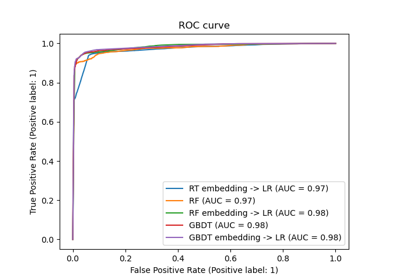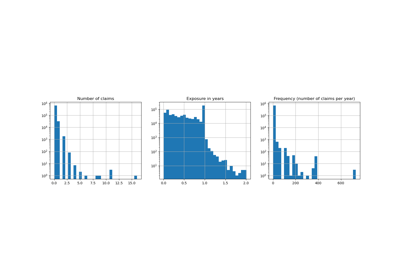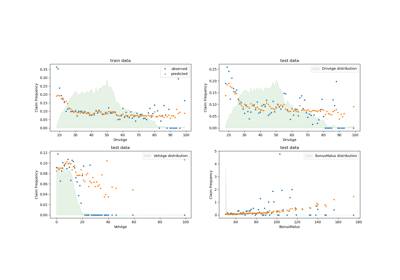sklearn.preprocessing.FunctionTransformer¶
- class sklearn.preprocessing.FunctionTransformer(func=None, inverse_func=None, *, validate=False, accept_sparse=False, check_inverse=True, kw_args=None, inv_kw_args=None)[source]¶
Constructs a transformer from an arbitrary callable.
A FunctionTransformer forwards its X (and optionally y) arguments to a user-defined function or function object and returns the result of this function. This is useful for stateless transformations such as taking the log of frequencies, doing custom scaling, etc.
Note: If a lambda is used as the function, then the resulting transformer will not be pickleable.
New in version 0.17.
Read more in the User Guide.
- Parameters
- funccallable, default=None
The callable to use for the transformation. This will be passed the same arguments as transform, with args and kwargs forwarded. If func is None, then func will be the identity function.
- inverse_funccallable, default=None
The callable to use for the inverse transformation. This will be passed the same arguments as inverse transform, with args and kwargs forwarded. If inverse_func is None, then inverse_func will be the identity function.
- validatebool, default=False
Indicate that the input X array should be checked before calling
func. The possibilities are:If False, there is no input validation.
If True, then X will be converted to a 2-dimensional NumPy array or sparse matrix. If the conversion is not possible an exception is raised.
Changed in version 0.22: The default of
validatechanged from True to False.- accept_sparsebool, default=False
Indicate that func accepts a sparse matrix as input. If validate is False, this has no effect. Otherwise, if accept_sparse is false, sparse matrix inputs will cause an exception to be raised.
- check_inversebool, default=True
Whether to check that or
funcfollowed byinverse_funcleads to the original inputs. It can be used for a sanity check, raising a warning when the condition is not fulfilled.New in version 0.20.
- kw_argsdict, default=None
Dictionary of additional keyword arguments to pass to func.
New in version 0.18.
- inv_kw_argsdict, default=None
Dictionary of additional keyword arguments to pass to inverse_func.
New in version 0.18.
- Attributes
See also
MaxAbsScalerScale each feature by its maximum absolute value.
StandardScalerStandardize features by removing the mean and scaling to unit variance.
LabelBinarizerBinarize labels in a one-vs-all fashion.
MultiLabelBinarizerTransform between iterable of iterables and a multilabel format.
Examples
>>> import numpy as np >>> from sklearn.preprocessing import FunctionTransformer >>> transformer = FunctionTransformer(np.log1p) >>> X = np.array([[0, 1], [2, 3]]) >>> transformer.transform(X) array([[0. , 0.6931...], [1.0986..., 1.3862...]])
Methods
fit(X[, y])Fit transformer by checking X.
fit_transform(X[, y])Fit to data, then transform it.
get_params([deep])Get parameters for this estimator.
Transform X using the inverse function.
set_params(**params)Set the parameters of this estimator.
transform(X)Transform X using the forward function.
- fit(X, y=None)[source]¶
Fit transformer by checking X.
If
validateisTrue,Xwill be checked.- Parameters
- Xarray-like, shape (n_samples, n_features)
Input array.
- yIgnored
Not used, present here for API consistency by convention.
- Returns
- selfobject
FunctionTransformer class instance.
- fit_transform(X, y=None, **fit_params)[source]¶
Fit to data, then transform it.
Fits transformer to
Xandywith optional parametersfit_paramsand returns a transformed version ofX.- Parameters
- Xarray-like of shape (n_samples, n_features)
Input samples.
- yarray-like of shape (n_samples,) or (n_samples, n_outputs), default=None
Target values (None for unsupervised transformations).
- **fit_paramsdict
Additional fit parameters.
- Returns
- X_newndarray array of shape (n_samples, n_features_new)
Transformed array.
- get_params(deep=True)[source]¶
Get parameters for this estimator.
- Parameters
- deepbool, default=True
If True, will return the parameters for this estimator and contained subobjects that are estimators.
- Returns
- paramsdict
Parameter names mapped to their values.
- inverse_transform(X)[source]¶
Transform X using the inverse function.
- Parameters
- Xarray-like, shape (n_samples, n_features)
Input array.
- Returns
- X_outarray-like, shape (n_samples, n_features)
Transformed input.
- set_params(**params)[source]¶
Set the parameters of this estimator.
The method works on simple estimators as well as on nested objects (such as
Pipeline). The latter have parameters of the form<component>__<parameter>so that it’s possible to update each component of a nested object.- Parameters
- **paramsdict
Estimator parameters.
- Returns
- selfestimator instance
Estimator instance.






